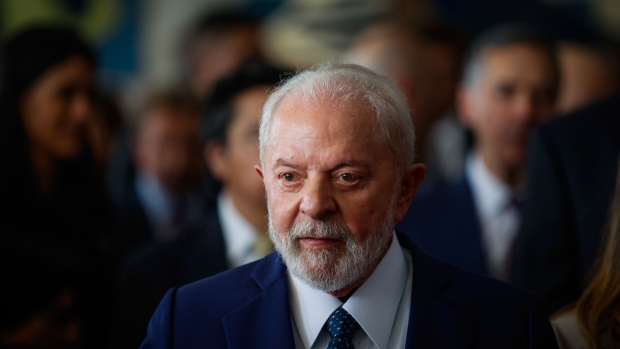Jan 22, 2024
Lula Unveils $60 Billion Plan to Revitalize Brazilian Industry
, Bloomberg News

(Bloomberg) -- President Luiz Inacio Lula da Silva’s government on Monday unveiled plans to invest 300 billion reais ($60 billion) into Brazil’s aging industries, a bid to boost Latin America’s largest economy that sparked fiscal worries among investors.
The financing is the backbone of a proposal the government dubbed “New Industry Brazil,” a sweeping reindustrialization plan that will provide credit and funding to sectors like health, defense and agribusiness. The vast majority of the funding, about 250 billion reais, will come from Brazil’s national development bank, BNDES.
The effort is vital to helping Brazilian industries compete on the global stage, Lula said at an event to tout the plan in Brasilia.
“For Brazil to become competitive, it has to finance some of the things it wants to export,” he said. “The international market debate is very competitive. It’s a war.”
But investors greeted the reindustrialization push with skepticism of both its design and size.
The Brazilian real lost 1.2%, lagging all major world currencies and trading at the weakest intraday level since November, as traders worried about the plan’s fiscal impact. Brazil sovereign bonds also underperformed, with notes due 2045 falling more than 1 cent on the dollar.
“The market is very skeptical of large industrial policy programs. This was tried in the past and was a spectacular failure,” said Alberto Ramos, a Latin America analyst at Goldman Sachs Group. “The weakness of the Brazilian real and Brazilian assets in general attest to the market discomfort with these types of policies.”
Much like the infrastructure investment package the government rolled out last year, the industry plan is a modeled broadly off of a program Lula leaned on during his previous presidency from 2003 to 2010.
This time, it also includes investments into decarbonization and modernization initiatives that reflect the leftist leader’s attempts to foster a green transition of Brazil’s economy.
“From here on out, the country will be able to count on permanent investments for neo-industrialization and Brazil’s ecological transition,” BNDES head Aloizio Mercadante said in a statement.
The plan’s fiscal risks may deepen the challenge facing Finance Minister Fernando Haddad as he seeks to follow through on pledges to eliminate Brazil’s primary deficit, which excludes interest payments, this year, said Guilherme Foureaux, a portfolio manager at Truxt Investimentos in Rio de Janeiro.
Haddad is set to resume negotiations with congress over revenue measures crucial to his zero-deficit goal next month, when lawmakers come back from recess.
“In February, the difficult discussions return to Brazil,” Forneaux said.
--With assistance from Bruna Lessa, Giovanna Bellotti Azevedo and Josue Leonel.
©2024 Bloomberg L.P.








